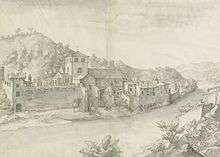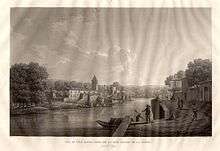Abbey of Île Barbe

The Abbey of Île Barbe was an Abbey built very early in the Christian era, on the Barbe island, outside of Lyon, France.[1][2]
The abbey was founded on the island in the 5th century and was the first monastic establishment in the Lyon region and one of the oldest in Gaul. Charlemagne endowed it with a beautiful library.[3]
The monastery, was however looted several times (in 676, and in 725 by the Saracens and in 937 by Hongrois). The abbey adopted the Rule of St. Benedict in the 9th century and gradually gained some wealth. In 816, Louis the Pious granted the monastery the right at any time of three ships on the Saone, the Rhone and the Doubs péages free of taxes; a decree of immunity and protection to monastère which was confirmed by Charles the Bald in 614.[4][5]

In the early 16th century, the abbey came under the commendatory of the family of Albon. In 1549, pope Paul III[6] it is secularized and the monks became canons (collegiate). In 1562, she was devastated and burned by the Protestant troops of Baron Adrets.
The chapter of canons was finally removed in 1741, and installs a facility for elderly or infirm priests, which in turn is removed in 1783. During the Revolution, at which point everything was sold and dispersed.
List of Abbotts
- 4??-??? : Saint Dorothée[7]
- ???-??? : Philetus
- ???-??? : Julien
- ???-??? : Christophe
- ???-??? : Antoine Ier
- ???-??? : Martin
- ???-??? : Aigobert
- ???-??? : Astorg Ier
- ???-??? : Maxime
- ???-??? : Ambroise
- ???-??? : Loup
- ???-??? : Maximin
- ???-??? : Bligigaire
- ???-??? : Vinfrid
- ???-??? : Rotfred
- ???-??? : Garland
- ???-??? : Licinius
- ???-??? : Saint Benoît Ier
- ???-??? : Campion
- ???-??? : Alaric
- ???-??? : Bartholomée
- ???-??? : Argeric
- ???-861 : Herbert
- 861-8?? : Gundramnus
- 8??-8?? : Norbert
- 8??-8?? : Varengard
- 8??-876 : Garlarin
- 876-8?? : Léobon
- 8??-??? : Astorg II
- ???-??? : Étienne
- ???-??? : Elgedis
- ???-??? : Antoine II
- ???-??? : Halinand
- ???-??? : Romuald
- ???-??? : Eudes
- ???-971 : Cumanus
- 971-994 : Heldebert
- 994-1007 : Benoît II
- 1007-1008 : Bernard
- 1008-1055 : Garnier
- 1055-1070 : Humbert
- 1070-10?? : Ogier
- 10??-1096 : Clément
- 1096-1116 : Guy Ier
- 1116-1128 : Girin Ier
- 1128-11?? : Josserand
- 11??-11?? : Hugues Ier
- 11??-11?? : Olderic
- 11??-1150 : Guillaume Ier
- 1150-1152 : Girin II
- 1152-11?? : Saturnin
- 11??-1168 : Vicard
- 1161 : Hugues de Tournon "Moine"
- 1168-1183 : Hugues II
- 1183-1198 : Guichard,[8] abbé
- 1198-1200 : Gaucerand
- 1200-1222 : Guy II
- 1222-1224 : Bermond
- 1224-1243 : Guillaume II de Jarez
- 1243-1245 : Foulques
- 1245-1246 : Omer
- 1246-1250 : Pierre Ier
- 1249 : Zacharie de Talaru "Moine"
- 1250 : Hugues de Varennes "Moine & Cellerier"
- 1250-1261 : Geoffroy de Vertelay
- 1256 : Zacharie de Talaru "Moine"
- 1261 : Humbert de Vassailleu "Moine"
- 1261-1270 : Pierre II de Vertelay
- 1270-1296 : Girin III de Sartines
- 1272 : Aymon de Vaux "Prieur Claustral"
- 1284-1440 : Hugues, Jean, Pierre & Pierre puis Claude de Roncherol "Moines"
- 1284 : Robert de Ryon "Religieux"
- 1296-1322 : André de Marzé
- 1300 : Estienne de Vego "Moine"
- 1309 : Guigues de Roussillon "Moine"
- 1322-1329 : Béraud Ier de Mercœur
- 1329-1334 : Pons de Guizeu
- 1334-13?? : Raymond de Beaufort
- 13??-13?? : Béraud II de La Baume
- 13??-1345 : Galbald
- 1345-134? : Simon de Gillans
- 134?-1350 : Bégon de Brossan
- 1350-1354 : Jean Ier Pilus-Fortis de Rabastens
- 1354-1372 : Guillaume III de Landore
- 1372-1394 : Pierre III de Villette
- 1383 : Pierre de Verriere "Aumosnier"
- 1394-1400 : Jean II de Sonhetto
- 1400-1428 : Pierre IV de Thurey
- 1401 : Pierre de Verriere "Aumosnier"
- 1411 : Faucerand du Saix "Religieux"
- 1419 : Antoine de Salornay "Moine"
- 1421 : Faucerand du Saix "Religieux"
- 1421 : Jean Rostain "Moine"
- 1428-1436 : Aynard de Cordon
- 1436 : Durand Vert "Moine"
- 1436 : Berno de Vienne "Moine"
- 1436 : Durand Vignols "Religieux"
- 1436-1458 : Claude Ier de Sotizon
- 1451 : Antoine de Rochefort la Valette "Moine"
- 1452 : Jean de Vaugrigneuse "Moine"
- 1453 : Eustache de Vaugrigneuse "Moine"
- 1453 : Aynard de Villeneufve "Chantre"
- 1455 : Guillaume de la Sale "Moine"
- 1458-1485 : Edouard de Messey
- 1464 : André le Viste "Religieux"
- 1485-1488 : cardinal Charles de Bourbon[9]
- 1488-1500 : Henri de Seylac
- 1500 : Philibert Rosset "Moine"
- 1507 : Guyllaume de Villeneufve "Moine"
- 1500-1515 : Antoine III d’Albon de Saint-André
- 1500 : Jacques de Sassenage "Religieux"
- 1505 : Guillaume de Semur "Religieux & Chamarier"
- 1515-1525 : Antoine IV d’Albon de Saint-Forgeul
- 1525-1562 : Antoine V d’Albon de Saint-Forgeul
- 1550 : Claude Sautreau "Moine & Chantre"
- 1551 : Fleury de Salemard "Religieux Cloistrier"
- 1551 : Louis Vallier "Moine"
- 1551 : Antoine de Vauselles "Moine"
- 1562-1599 : Pierre V d’Espignac
- 1599-1609 : Jean III de Châtillon
- 1606-1613 : Claude II de Nérestang
- 1616-1620 : Antoine VI de Nérestang
- 1620-1693 : Camille de Neufville de Villeroy
- 1630-1660 : Claude Le Laboureur, prévôt du chapitre
- 1693-1741 : Antoine VII de Thélis de Saint-Cyr de Valorges
References
- ↑ History of barbe Island.
- ↑ Louis le Pieux à l’abbaye de l’Ile-Barbe.
- ↑ le roi Charles à l’abbaye de l’Ile-Barbe.
- ↑ Bésian Arroy, Brève et dévote histoire de l'abbaye de l'Isle Barbe, Lyon, 1668.
- ↑ J. Picot, La seigneurie de l'abbaye de l'Ile-Barbe, Lyon, 1953
- ↑ Notice d'autorité de la bibliothèque nationale de France sur le chapitre de la collégiale Saint-Martin de l'Île-Barbe
- ↑ Vies des Saints du diocèse de Lyon par François-Zénon Collombet (1835)
- ↑ Topographie historique du département de l'Ain, 201.
- ↑ Bernard Berthod, Jacqueline Boucher, Bruno Galland Régis Ladous and André Pelletier, Archevêques de Lyon (Éditions lyonnaises d'art et d'histoire , Lyon 2012) p77.